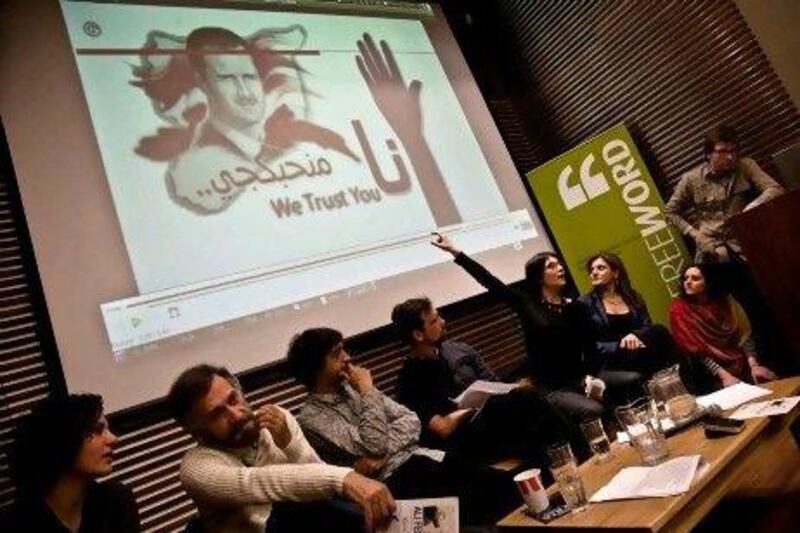On Thursday, one year to the day from the first stirrings of unrest in Syria, a crowd gathered in London's Frontline Club for a screening of two films by the late director Omar Amiralay. Shown in association with Dox Box, the annual Syrian documentary festival, these short yet powerful works made a stark and appropriate introduction to Reel Syria - a four-day programme of art and culture being held in London and Edinburgh.
Made in 1974, Film Essay on the Euphrates Dam chronicles the progress of one of President Hafez Al Assad's most ambitious infrastructural projects. Clearly enamoured of the late Syrian leader's thrusting sense of ambition, Amiralay's imagery is little short of heroic. Yet by 2003, the year of A Flood in Ba'ath Country, these illusions have been shattered by 30 years of broken promises. Neither piece, however, could prepare the audience for the world premiere of Tournesols, a brief yet harrowing collection of personal reflections on the recent uprisings produced by an anonymous filmmaker, which only managed to find its way to the organisers that very morning.
In addition to the cinematic offerings that give the festival its name, among them a showing of Zabad by Reem Ali, the second day of Reel Syria offered a lively discussion titled "Culture Under Fire". Chaired by the British-Syrian author Robin Yassin-Kassab, members of the panel, including the writer Manhal Alsarraj and the acclaimed cartoonist Ali Farzat, examined the nature and role of art in times of conflict.
Alsarraj is well-placed to describe the fine line artists are forced to tread in such situations. Her 2000 novel, As the River Must, is banned in Syria for discussing the infamous Hama massacre of 1982. As a result, she now lives and works in Sweden. Farzat, however, has chosen to stay in Syria despite being seized upon in August by masked men who proceeded to break both his hands as a "warning" for lampooning President Bashar Al Assad in his drawings. Now fully recovered, Farzat is an impressive and engaging figure who remains defiantly hopeful, poetically referring to his home as a vibrant and diverse "cultural mosaic".
As if to prove this point, last night Samih Choukeir, a singer whose richly melodic work occupies a special place in many a Syrian heart, took to the stage at Kensington Town Hall. The show marked the end of a day of fund-raising by the fittingly named Mosaic Initiative, an organisation dedicated to providing humanitarian relief for citizens affected by the uprisings. Continuing on a musical note, today also provides a grand (and probably far noisier) finale by the author, artist and former leader of the 1990s avant-garde pop outfit KLF, Bill Drummond. The 100 volunteer members of his "international choir" The17, many of whom are from London's Syrian diaspora, will each play a part in creating SURROUND in Damascus, a score originally intended to be performed last year on top of the city's medieval city walls.
Forced to change its location to London, Drummond's project perfectly encapsulates the difficulties faced by all those involved in Reel Syria. Its exiled status also illustrates how the developments of the last year have lent far greater meaning to the festival than its organisers may have initially anticipated. While a responsible and considered celebration of Syrian art and culture is both timely and apt, the programme's political resonances are best viewed as the unavoidable result of current events, rather than carefully calculated selling points.
As the festival director Dan Gorman explains: "The basic idea of Reel festivals was to show that people who are caught up in the world's conflicts are actual people - people who create things, think things, dream things ... We had previously put on events concentrating on Afghanistan and Iraq. Last year, though, our aim was to do reciprocal festivals focusing on areas that weren't in a state of overt conflict, but that people still had a certain received idea about. We felt that Lebanon and Syria were perfect, and came up with the concept of a three-way festival of film, music and literature held in both of those locations and the UK.
"We started planning this in late 2010, to take place in May 2011. Then, by March, the situation had changed quite drastically. We ended up working in Lebanon and bringing some Syrian artists there, but ideally wanted to go to Syria within a year to do a follow-up event there. Then it turned out that we couldn't. Obviously, now Syria is front-page news - everyone has heard of Dara'a and Homs now, which was never the case before - so many of the questions we're encountering are directly related to that. That's inevitable, but at the same time we're still hoping that we will be able to offer a much more nuanced picture of the country and its people."
For more information, visit www.reelfestivals.org/reel-syria
Follow
Arts & Life on Twitter
to keep up with all the latest news and events
[ @LifeNationalUAE ]





